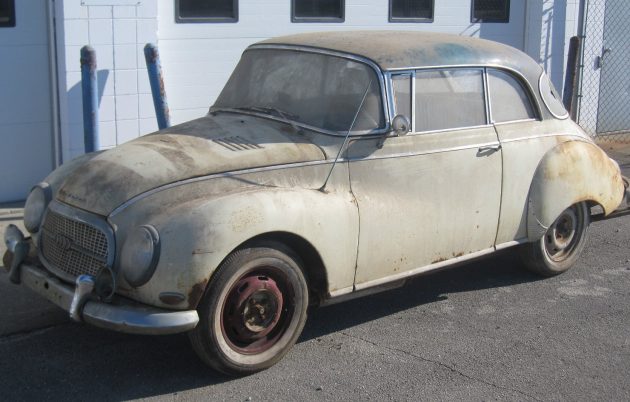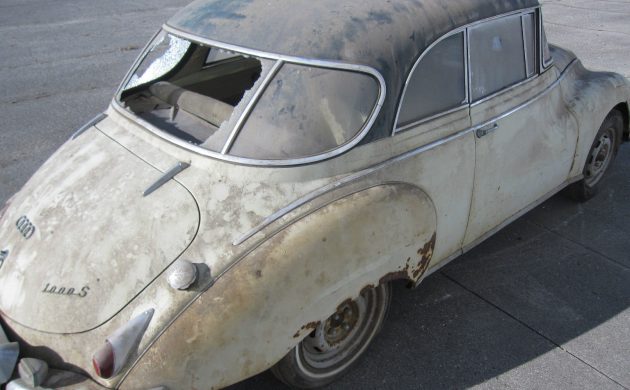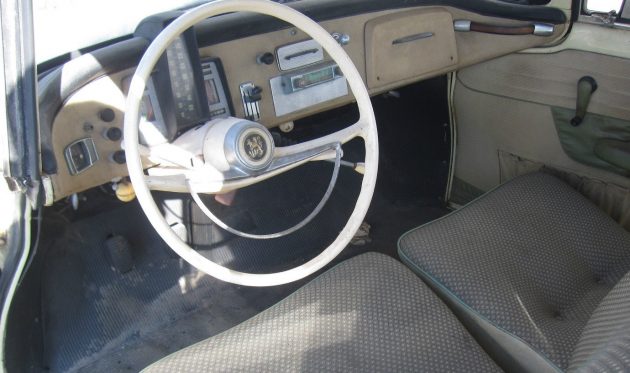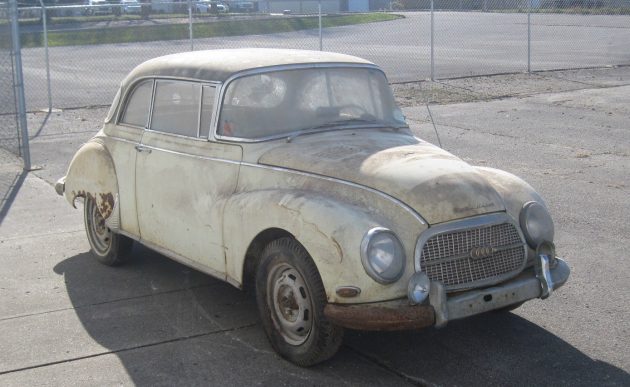An airplane hanger seems like the ideal setup for housing a large collection of vehicles, and that’s exactly what the husband of the owner of this unusual DKW 1000 S here on eBay did on a remote airfield in Illinois. It makes me wonder how many other small landing strips with a solitary outbuilding or two have unusual cars hiding inside of them!
I’ve always been intrigued by these DKWs, a precursor to the modern Audi brand. Of course, I already have an inclination towards funky German vehicles, especially since these cars strike me as a slightly more upscale Beetle. I blame the headlights and fenders for reminding me of the more commonplace German sedan of the air-cooled variety, but the similarities end there – especially as it relates to likely parts availability!
But on that note, the seller claims this car is so complete, you won’t be hunting for much. And after checking out that interior photo, I am inclined to agree. It looks like brand new inside! Of the few of these DKWs that seem to pop up each year, I cannot remember seeing one with nearly this nice of an interior. The cloth seating surfaces are un-torn and the dash panel appears to be in very good condition.
The seller says the one female owner used this German oddity to commute to the local college where she worked. Frankly, this whole story just makes me like this DKW even more: a careful female owner who used it for in-town commuting before a simple rough idle issue sent it to the airplane hanger in the middle of nowhere, prompting an extended period of dormancy before being unearthed. It’s a barn find in every sense, and looks deserving of restoration.










Looks like it may be an easy restoration, with the exception of the back glass which may have a slight curve. “Yes, I’m looking for a rear windshield for a ’61 DKW….hello? hello?”
Interesting, but when you are done restoring it, what do you use it for? I can’t imagine driving around belching blue smoke from a 2 cycle engine, while trying to make 50 horsepower keep up with traffic. Someone may pull up alongside and start throwing things at it. I had that experience in a diesel, when a WOMAN in truck passed me, throwing her 32oz Big Gulp at my windshield.
What did you expect from a “woman”
in a truck having a 660 ml big gulp?
I bet she was not only impatient, but also fat, ugly and very stupid.
You’d be surprised at the speed of it! Cruising at 85 mph is no problem for this car….. all day long too.
Scotty, that warehouse finished yet, because here’s another one for you. Again, could have cleaned it up. Sure is odd looking, like a giant bug. Clearly, it’s not something to go out on I-94 with ( unless it’s stopped, which it usually is, hey Scotty?) and I’m sure the 2 cycle would be frowned upon, if not down right illegal in some states. Maybe a Saab V-4 would work. I’ve always wondered if people from other countries look at our 1961 cars and go “what the heck is that”? Pretty cool find.
One of the most misspelled words in the English language –
hangar.
It’s an airplane hangar, not a hanger.
Spelling Nazi over and out.
If someone invented a device that supported an airplane from the ceiling and installed it in a building made for storing aircraft would that be an airplane hanger in an airplane hangar ?
In Reading,Pa. there was a plane hanging from the ceiling in the dinning room of a restaurant. Now properly being cared for and flying at the Golden Age Air Museum after the restaurant/hotel was torn down for yet another shopping center.
Storage inspired by Dirk Pitt?
I was around these when I had my shop in Germany……nicely designed solid little cars. I don’t remember them smoking much. I am sure they will outrun a VW in most cases. The cars I remember smoking were the Audi 100’s. they seemed to have soft blocks or rings, they needed a ring job every 50K miles. It was easy to do, didn’t even have to pull the engine. A 4 hr job.
Hi Dave, out run a VW you say, wow. Say what you will, nothing smokes like a Saab 93 with too much oil in it. Very common.
True……but when they are in good repair and the mixture is correct, they are not bad. I think we tend to over oil a 2 stroke just for good measure. I locked up a Bultaco street bike at speed one time on the freeway…nice summer day, short sleeve shirt and slacks doing probably 70……I had just taken the bike on trade towards a race car I was selling, I,asked the guy if it had an oiler or needed to be mixed……he showed me the oiler, it had plenty in it so being late to work, I zoomed off as fast as it would go……..what he neglected to tell me is you had to give the fuel a few pumps to mix it into the tank……..so at about 70mph the bars started slapping the tank as the engine locked up……I figured real quick to grab the clutch and it rolled out……scared me more than anything I ever did in the military……so, I am real careful about having enough oil in a 2 stroke.
Howard & Dave: Unlike the typical* SAAB, the Auto Union 1000 engine had a mechanical oil injection pump and metering device at the carb, so these cars had almost no blue haze coming out of the tailpipe. I have an Auto Union 1000SP, a 2-seat sports model with a body by Bauer of Germany, the shop that built the Porsche Speedster and the early Karmann Ghia cars. People say my Auto Union looks like a miniature 57 T-bird, but with a hardtop coupe body. [See pic]
*The typical SAAB required the driver to pour a can of oil into the gas tank before filling it, and most people had a difficult time figuring out how much oil to dump in for 5/8 of a tank, 7/8 of a tank, etc. So people often just dumped in more than required, just to be safe, because if you don’t use enough oil, the engine seizes up solid.
The high performance SAAB 750 & 850 engines in the GT cars did have oil injection. I had a factory prepared 850 GT Monte Carlo rallye car, and the local guys with hot Mustangs & Camaros just didn’t have the ability to keep up with my little SAAB on winding roads, not even close!
The 1960 93F SAAB 2-stroke that I had in the 60s had a red light in the gas gauge that came on when you had room for 8 gallons in the tank. Pretty simple to put the oil in and add only 8 gallons. Never a problem. No guesswork.
The only person confused would have sometimes been the gas station attendant who pumped the gas after I put the oil in. Many of them told me that I would screw up the engine if I did that. For added laughs, I usually let those guys try to check the oil level in the crankcase. (Which station attendants routinely did back then.) Of course 2-strokes, having no oil in the crankcase, have no dipstick either.
I remember the Audi 100 my father bought in 1973. Had it for 6 years – 1 valve job, 2 ring jobs…and not a very good warranty.
Would be fun to pull into an Audi dealer and count the blank stares…
One of the interesting features of the DKW triple 2-stroke engine was that it had no water pump. The cooling water was moved through the cooling system via thermosiphon – aka: hot water rises. Notice the large diameter water hose connecting the head to the top of the radiator. Apparently it worked well enough to maintain temperature control – although I wouldn’t be surprised if you sat in traffic on an August afternoon in Phoenix that you might find yourself in hot water (pun intended).
I have a friend who drove at DKW during Pharmacy School in Idaho. My children, if asked, will remember the name of Kirk’s Pharmacy in Tanglewild, just north of Olympia, WA.
Never was a big fan of European cars, but there’s just something about this car. It reminds me of the little kid who got left on the porch when the bigger kids went to play ball, you can’t help feeling for it, and wanting to help it improve its station in life.
At one time years ago, I owned a 1963 German Ford Taunus 12m sedan which had been brought to the states by a service man. It had an overhead valve V4 later used by Saab in their Sonnets. The Taunus had a broken front lower control arm caused by a broken CV joint. I was able to find a used DKW in a local scrap yard, which provided all of the parts I needed.
I once had a car that was the front half of a 3=6 welded onto a Messerschmitt kr200. You would be amazed at how powerful these 3 cylinder engines are. Screamers. 60 mph no problem.
Reminds me of a Borgward !
Good cars the DKW’s here in South Africa lots of spares
my Father was a DKW mechanic in Germany before he
immigrated to S.A so we know Oom Johnny’s shop and all the
whereabouts of spare parts, they both pasted on know RIP
It was parked because of a “simple rough idle issue”. Don’t forget how difficult parts were to find back in the 60s and 70s. I had a Morris Minor I needed parts for. British Leyland US ignored me and when I contacted Leyland UK, I was told I had to deal with Leyland US. Never did get the parts. I have a friend that sold an Isetta for $25 because he couldn’t find points for it. Now, the internet gives worldwide access, but it wasn’t always so.
MikeH –
Back in the early 80s I was contacted by someone in the middle east, his boss had hundreds of mint 1930s thru 1970s American & British cars [still does], and needed spare parts. I began supplying parts at a huge markup [the guy was not just wealthy, he was mega rich, and didn’t care about the cost, as long as the part was correct.] I supplied thousands of parts over about 15 years, but once the internet was well established, they no longer had need of my service. And I lost a damn good income source!
This client had brand new, unused cars like 1957 Chevy Bel Air convertible, No heater, but had factory A/C, and Rochester F.I. Yeah, I know, GM said you can’t get both, but if you have that kind of money, you can!
He also has 4, yes 4, 1958 Cadillac 60 Special sedans, sequential chassis numbers, each car having between 8 and 12 miles.
Or a 1958 Buick Limited 4-door hardtop station wagon. Buick never offered them. The Fisher body tag on the firewall had a blank spot for the body style number, and the body number was simply 1.
1954 Packard Convertible, Red with Red leather, Stick shift & overdrive, no heater, radio or clock, and had only done about 4,000km [2,500 miles].
And no, none of the cars are for sale. Impossible to buy.
Really a great story on the middle eastern US car collection, thanks for sharing. I read a recent coverage in a swedish classic car magazine about old iron like early Mustangs and some 50´s land barges having survived the war in Syria – although a miniscule subject in the greater sceme of things, it kind of keeps the hope up for man kind to see that car guys never gives in their lifestyle no matter what the circumstanses may push over them.
As for the spare parts issue on the DKW´s: If anyone needs to change the shock absorbers on one of those AU 1000/DKW 3=6 (or their likes), it´s been told in a swedish classic mag´s webpage they can be exchanged front and rear for rear shocks made for the Volvo 140. I´m not exactly sure if you could fit the more easily found rear shocks for the Volvo 240 but it is propable as they are in most ways the same from the windshield and rearwards. The source also stated that the original DKW shocks had built-in stops which modern shocks don´t have, but that this should not be a problem.
More from that source is that these engines have vulnerable main bearings and there for it´s a bad idea to use the type of 2-stroke oil used for outboard boat engines. If the engine has sat still for a longer period (a couple of months or so), you should make sure that the main bearings are drenched in oil before you attempt to start the engine. If the main bearings are worn out, there are some used in Kawasaki motorcycle engines that can be used, however no more intel was given on that subject other than they are really expensive.
There has also been said that Audi/VAG does some reproduction of spare parts but those are provided through a third-party seller (name was not given). No textile materials for the interior seems to be avaible, at least not in Europe.
I guess this is a DKW less likely to find: https://www.undiscoveredclassics.com/forgotten-fiberglass/the-dkw-flintridge-a-new-howard-dutch-darrin-sports-car-design/